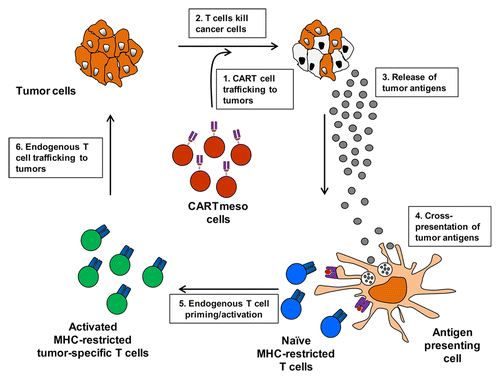Figures & data
Figure 1. Chimeric antigen receptor modified T cell adoptive therapy induces an endogenous antitumor immune response through epitope spreading. Autologous chimeric antigen receptor (CAR)-engineered T cells induce the development of an endogenous antitumor immune response through a multi-step cyclical process as follows: 1) CAR-modified T (CART) cells infiltrate tumor lesions. 2) CART cells recognize tumor antigen expressed on the surface of cancer cells leading to tumor cell lysis. 3) Dying cancer cells release tumor antigens. 4) Tumor-associated proteins are engulfed by antigen presenting cells which process and present tumor-associated peptides in the context of major histocompatibility molecules (MHC) to endogenous T cells. 5) Tumor-specific T cells recognizing peptide/MHC complexes are primed and become activated. 6) Nascent, activated tumor-specific T cells infiltrate tumor lesions. Infiltrating tumor-specific T cells recognize tumor cells via T cell receptor engagement of peptide/MHC complexes present on tumor cells amplifying the initial antitumor T-cell response.

